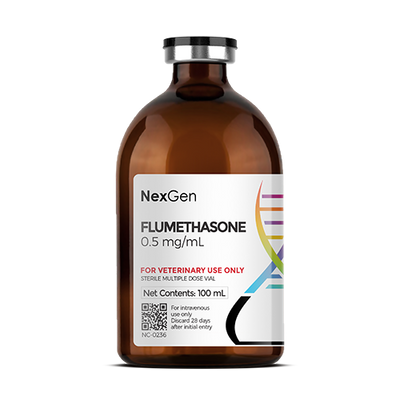
Acetylcysteine 200 mg/mL, Injectable Solution, 100mL
Login for pricing
- Brand
- NexGen
- SKU:
- NC-0521
- Product Type:
- Injectable
- Size:
- 100ml
- Administration:
- Intravenous
In addition to its use as an antidote to acetaminophen activity, acetylcysteine is used for the treatment of canine degenerative myelopathy and as an adjunctive treatment of hepatic lipidosis in dogs and cats, to break up chondroids in the guttural pouch of horses and to break up meconium refractory neonatal foals. Its efficacy in the treatment of mares with Persistent Breeding-Induced Endometritis is also under study.2
Acetylcysteine is an acetylated derivative of the amino acid L-cysteine. Its mucolytic activity has made it useful in horses suffering from respiratory tract diseases involving increased mucus production.
Mucus Production in the Horse
The mucous membranes lining the horse’s nasal and pulmonary passages are sensitive. Materials (whether infectious or not) that aggravate them or causes inflammation can lead to production of additional mucus or fluid that is often evidenced by a runny nose and cough.
In the case of a horse presenting with nasal discharge alone, the initial assessment is based on:
- Color
- Consistency
- Amount
- Whether discharge is bilateral or unilateral
- Whether discharge has an odor and what type
- Whether blood is present
Additional observations that may help to determine whether an allergic reaction or infection is or is not restricted to the nasal passages include:
- The horse’s demeanor
- Brightness/dullness of the eyes
- Exercise tolerance
- Whether the horse is eating and drinking normally
- Fecal and urine output
- Body temperature
- Presence of colic or abdominal discomfort.3
Acetylcysteine for Equines
While nasal discharge and couch in horses often results from environmental contaminants, among the most common bacterial causes of nasal discharge are Streptococcus equi zooepidemicus, which can lead to pneumonia, and S. equi equi,which causes strangles. Very often, horses with strangles do not develop nasal discharge until later in the disease process.3
Where to buy Acetylcysteine
Acetylcysteine is available in the U.S. through pharmaceutical manufacturers and through veterinary custom compounding companies.
Please consult your veterinarian prior to beginning any treatment regimen.
FOR RX ONLY: A valid prescription from a licensed veterinarian is required for dispensing this medication.
2Caissie M.D., et. al., The Effects of Treatment with N-Acetyl Cysteine on Clinical Signs in Persistent Breeding-Induced Endometritis Susceptible Mares. J Equine Vet Sci. 2020 Sep;92:103142. doi: 10.1016/j.jevs.2020.103142. Epub 2020 May 30. PMID: 32797774.



















